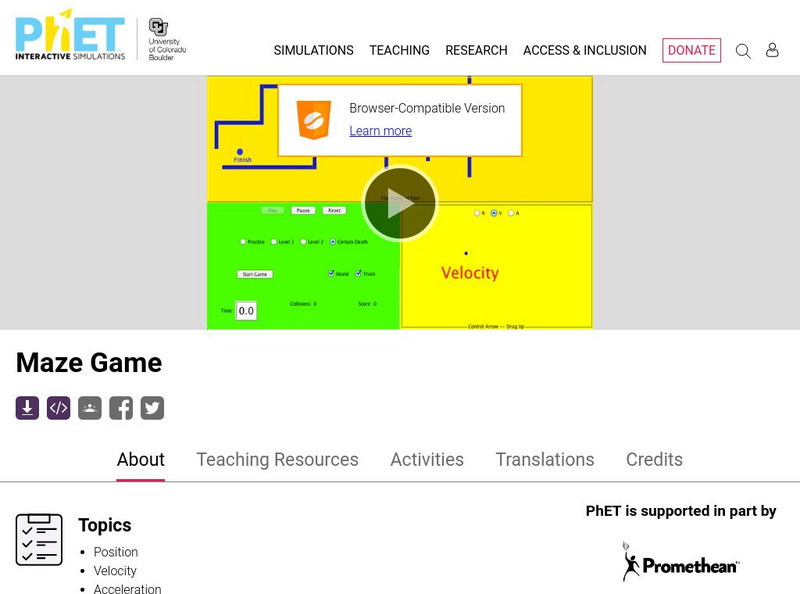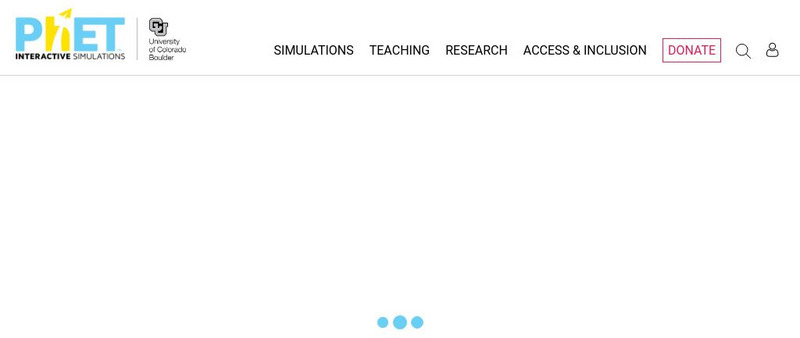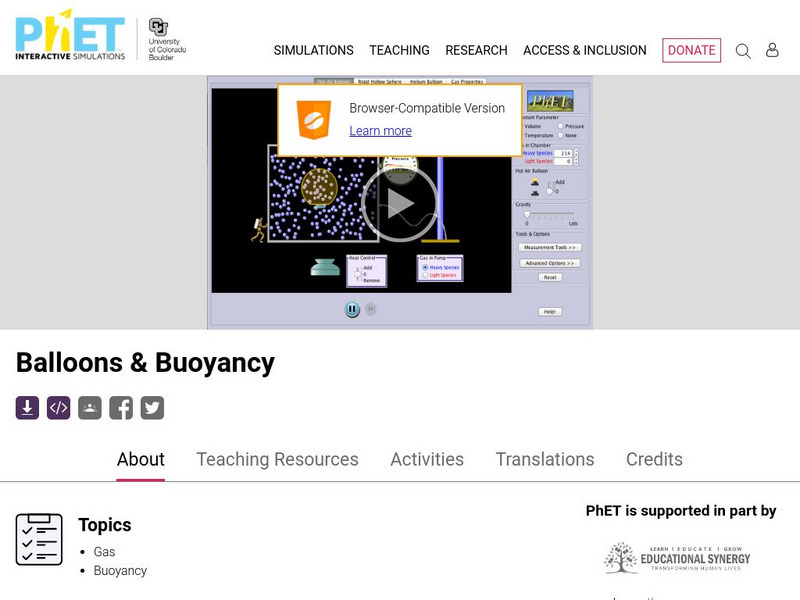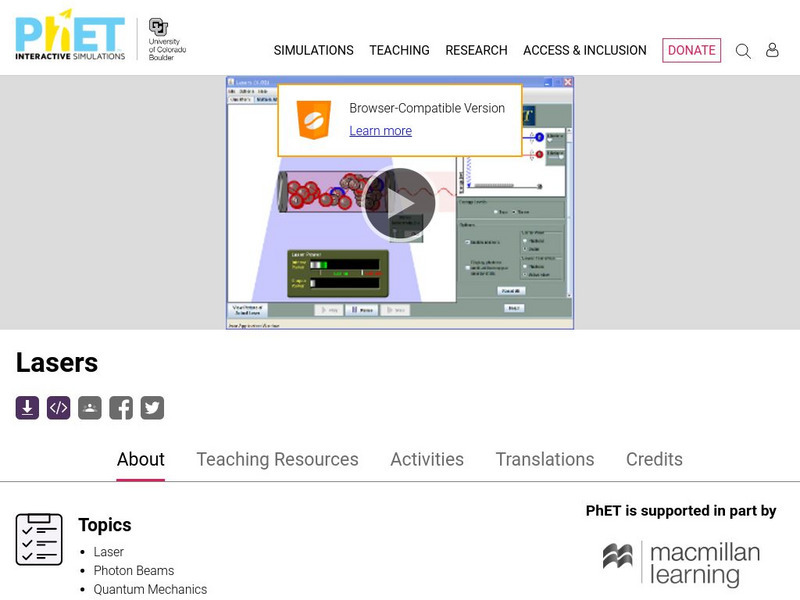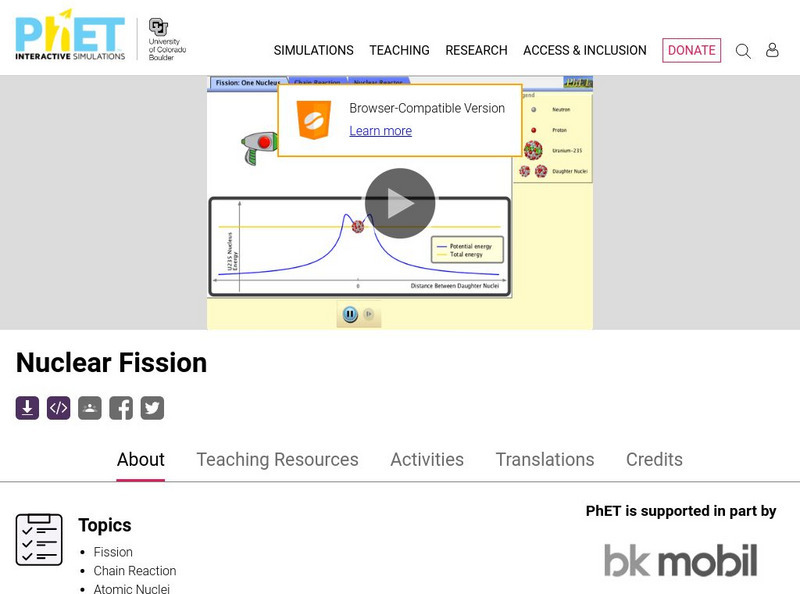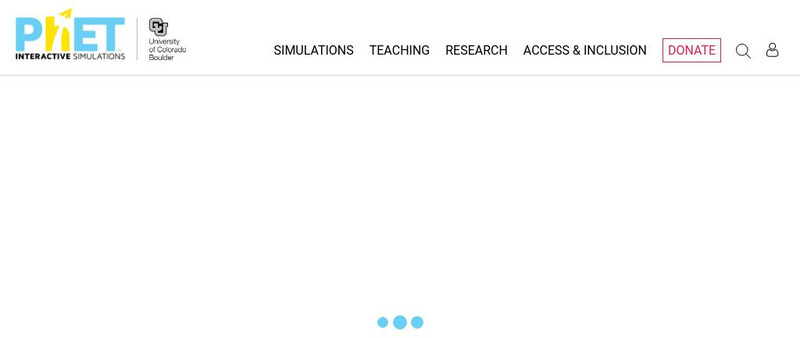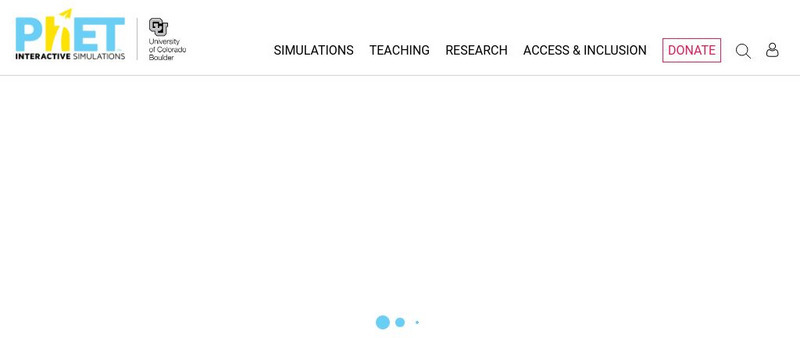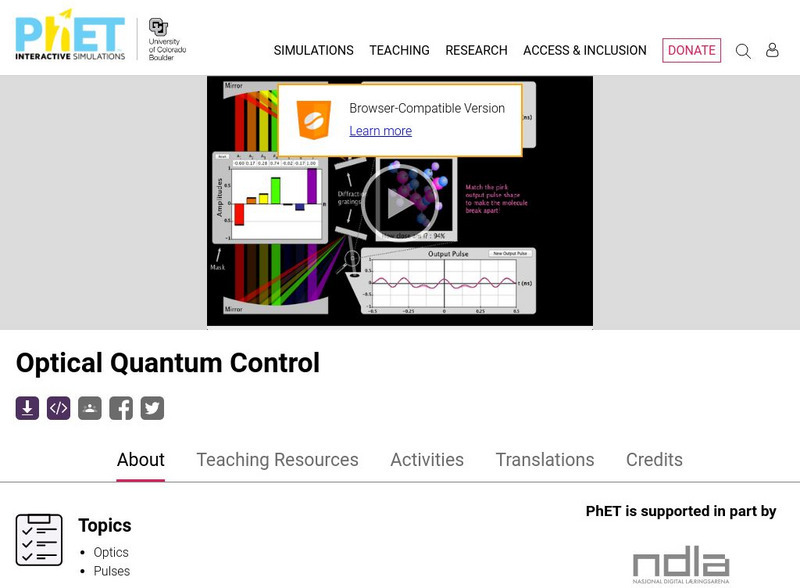University of Colorado
University of Colorado: Ph Et Interactive Simulations: Magnet and Compass
Ever wonder how a compass worked to point you to the Arctic? Explore the interactions between a compass and bar magnet, and then add the earth and find the surprising answer.
University of Colorado
University of Colorado: Ph Et Interactive Simulations: Magnets and Electromagnets
Explore the interactions between a compass and bar magnet. Discover how to use a battery and wire to make a magnet.
University of Colorado
University of Colorado: Ph Et Interactive Simulations: Maze Game
Learn about position, velocity, and acceleration in the "Arena of Pain." Use the green arrow to move the ball. Add more walls to the arena to make the game more difficult. Try to make a goal as fast as you can.
University of Colorado
University of Colorado: Ph Et Interactive Simulations: Signal Circuit
Why do the lights turn on in a room as soon as you flip a switch? Flip the switch and watch the electrons. Does the light turn on immediately? Explain using observations of the model.
University of Colorado
University of Colorado: Ph Et Interactive Simulations: Wave Interference
Make waves with a dripping faucet, audio speaker, or laser. Add a second source or a pair of slits to create an interference pattern.
University of Colorado
University of Colorado: Ph Et Interactive Simulations: Wave on a String
Explore the wonderful world of waves! Observe a string vibrate in slow motion. Wiggle the end of the string and make waves, or adjust the frequency and amplitude of an oscillator.
University of Colorado
University of Colorado: Ph Et Interactive Simulations: Balloons & Buoyancy
Experiment with a helium balloon, a hot air balloon, or a rigid sphere filled with different gases. Discover what makes some balloons float and others sink.
University of Colorado
University of Colorado: Ph Et Interactive Simulations: Circuit Construction Kit (Ac+dc), Virtual Lab
Build circuits with capacitors, inductors, resistors and AC or DC voltage sources, and inspect them using lab instruments such as voltmeters and ammeters.
University of Colorado
University of Colorado: Ph Et Interactive Simulations: Ladybug Revolution
Join the ladybug in an exploration of rotational motion. Rotate the merry-go-round to change its angle, or choose a constant angular velocity or angular acceleration. Explore how circular motion relates to the bug's x,y position,...
University of Colorado
University of Colorado: Ph Et Interactive Simulations: Lasers
Create a laser by pumping the chamber with a photon beam. Manage the energy states of the laser's atoms to control its output.
University of Colorado
University of Colorado: Ph Et Interactive Simulations: Nuclear Fission
Start a chain reaction, or introduce non-radioactive isotopes to prevent one. Control energy production in a nuclear reactor.
University of Colorado
University of Colorado: Ph Et Interactive Simulations: Torque
Investigate how torque causes an object to rotate. Discover the relationships between angular acceleration, moment of inertia, angular momentum and torque.
University of Colorado
University of Colorado: Ph Et Interactive Simulations: Vector Addition
Learn how to add vectors. Drag vectors onto a graph, change their length and angle, and sum them together. The magnitude, angle, and components of each vector can be displayed in several formats.
University of Colorado
University of Colorado: Ph Et Interactive Simulations: Gene Expression the Basics
Generate and collect three types of proteins, then move on to explore the factors that affect protein synthesis in a cell.
University of Colorado
University of Colorado: Ph Et Interactive Simulations: Optical Quantum Control
Explore an active area of research in optical physics: producing designer pulse shapes to achieve specific purposes, such as breaking apart a molecule.
University of Colorado
University of Colorado: Ph Et Interactive Simulations: The Ramp
Explore forces, energy, and work as you push household objects up and down a ramp. Lower and raise the ramp to see how the angle of inclination affects the parallel forces acting on the file cabinet. Graphs show forces, energy and work.
University of Colorado
University of Colorado: Ph Et Interactive Simulations: Reversible Reactions
Watch a reaction proceed over time. How does total energy affect a reaction rate? This model represents an analogy of chemical reactions.
University of Colorado
University of Colorado: Ph Et Interactive Simulations: Quantum Tunneling and Wave Packets
Watch quantum "particles" tunnel through barriers. Explore the properties of the wave functions that describe these particles.
University of Colorado
University of Colorado: Ph Et Interactive Simulations: Self Driven Particle Model
An interactive tutorial that introduces the particle model incrementally and depicts the computation of the order parameter, critical parameter, and critical exponent.
University of Colorado
University of Colorado: Ph Et Interactive Simulations: Balancing Chemical Equations
An interactive simulation with weights and scales that teaches about balancing chemical equations and conservation of mass. This simulation can either be downloaded or played online and includes handouts, lesson plans, and additional...
University of Colorado
University of Colorado: Ph Et Interactive Simulations: Balloons and Static Electricity
An interactive simulation with balloons and a sweater that teaches about static electricity, electric charges, and electric force. This simulation can either be downloaded or played online and includes handouts, lesson plans, and...
University of Colorado
University of Colorado: Ph Et Interactive Simulations: Beer's Law Lab
An interactive simulation that teaches about Beer's Law, solutions, concentration, spectrophotometry, and more through observations to explore how much light is absorbed and transmitted with changes in thickness and color. This...
University of Colorado
University of Colorado: Ph Et Interactive Simulations: Blackbody Spectrum
An interactive simulation that teaches about blackbody, sun, light, and quantum mechanics. Students learn my making observations while changing the temperature with a sun, a light bulb, an oven, and the Earth in order to see the changes...
University of Colorado
University of Colorado: Ph Et Interactive Simulations: Buoyancy
An interactive simulation that teaches about buoyancy and density by applying various forces and modifying the properties of objects and fluids. This simulation can either be downloaded or played online and includes handouts, lesson...




